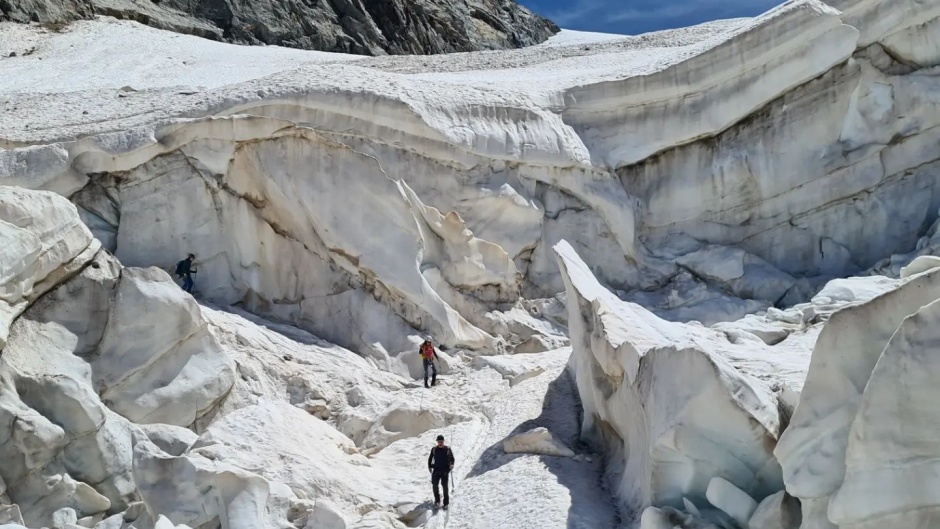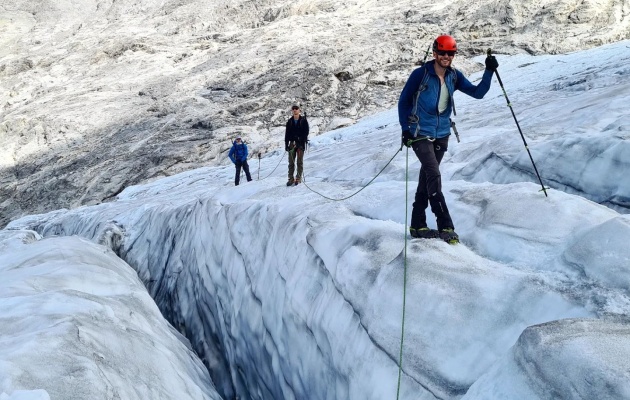“In August, glaciers looked worse than normally at the end of September”
Raphael Moser is a mountain guide in the Swiss Alps. He is thankful to be part of a “generation that is able to see and admire these impressive elements and formations”.
BERN · 30 AUGUST 2022 · 10:08 CET

Why is at a problem that glaciers melt earlier than before? A mountain guide in the Swiss Alps shared his perspectives with Evangelical Focus.
For Raphael Moser, who leads groups in challenging routes through the mountains, there is no doubt that something is not working well in Europe’s highest landscapes.
“At present, the melting of ice in the glaciers is about 6 weeks ahead of an average year, which means that we are well on the way to even more ice melting this year than in the record year of 2003”, he says. “It’s mid August but the glaciers look worse than normally at the end of September”.
.jpg)
Raphael Moser in the Alps of Valais, Switzerland. / Upward.ch Raphael considers himself “a relatively young mountain guide” but he has already observed many changes that “fascinate me but also make me think”, he explains. “Glaciers are retreating significantly or disappearing, mountain tours are becoming more difficult or even too dangerous. Due to the disappearing permafrost and high temperatures in high altitudes, there are more rockfalls or even rockslides”.
A very warm 2022 summer
The summer has been especially hot throughout the continent. The Copernicus programme of the European Union measured significant deviations in surface air temperature. Heatwaves in July brought “local and national records to the western and northern parts of the continent”, Copernicus reports show.
Glaciers in the Alps are free of snow earlier. “This year in the Alps, the fact that less snow fell on glaciers in winter than average is a significant factor”, observes Moser. This has to be added to the alarming fact that water is freezing at a much higher temperature than before: not even the Mont Blanc peak with its 4,808 metres could stay under 0 degrees at some points of July 2022.
“The glaciers serve as water reservoirs (precipitation turns to snow and then to ice) and in the warmer summer months they continue to release water after the snow has melted. In the longer term, with melting glaciers, less water will be available for drinking, for agriculture, shipping, wildlife, etc.... This means that the water supply becomes increasingly critical in the summer months”.
The slow disappearance of glaciers has a worrying chain effect on the whole biosphere. “Less water in summer also means more drought and dried-up or low streams and rivers. Animals and humans, as well as the vegetation, will have to adapt to longer periods of drought and will probably suffer as a result. For many sensitive plants and animals, the rising zero-degree limit means that they will have to adapt their habitat to higher altitudes and may be displaced by other species in the long term”.

Working as a mountain guide
Many scientists say climate change is a driving force in these developments. Moser agrees: “In addition to the lack of meltwater from glaciers, climate change is also causing concern about the increasing dangers of unstable terrain in the mountains, droughts and increasing severe weather events (heavy precipitation, floods, debris flows)”.
“As a mountain guide, my first concern is the safety of the clients: risk management includes assessing the terrain and choosing a safe route. With this choice, one can still undertake many very beautiful and incredibly impressive routes”.
That is, he says, his “second goal: to give the guests a unique experience in the beautiful creation. I enjoy every day that I am allowed to be out in the mountains!”. Raphael is thankful to still belong to a “generation that is able to see and admire these impressive elements and formations”, which are “a wonderful gift”.
“As Christians, we should care for nature and people”
How does being a Christian change your perceptions of nature, we ask Moser. In the mountains, “it is clearly nature, the elements and conditions, who determine the possibilities. Every now and then, we are even allowed to climb a peak or admire an awesome sunrise, but it’s not given. I become very small and God’s power and beauty in nature very big”. “Personally”, he adds, “I feel freer, can admire better and experience again and again how small, dependent and exposed to the elements we are”.
Believing in the God of the Bible adds a strong sense of responsibility. “I am convinced that we as human beings have been given the responsibility to care for the world, nature, animals and fellow human beings and to treat God’s creation with respect”, says Raphael. “As Christians, we therefore also clearly have the task, in my view, of leading by example and standing up for nature”.
“It is my and everyone’s personal responsibility to work to reduce emissions and care for nature and people. As believers in everyday life, we can make a big difference or at least honour God through our small and perhaps ‘insignificant’ actions”.
About Raphael Moser

Raphael Moser is a mountain guide and sports coach specialised in Alpine routes. His business Upward offers guidance for high tours, high mountain skiing, as well as training for a range of other Alpine activities such as rock climbing.
Published in: Evangelical Focus - science - “In August, glaciers looked worse than normally at the end of September”
Since you are here…
Evangelical Focus is a news and opinion platform that brings together Christians from across Europe and other parts of the world. We need the support of our readers to make this media project sustainable in the long term. You can support our work! Read about Evangelical Focus’s sustainability here.
Would you like to support the work of Evangelical Focus?
Use one of these methods. You can also transfer your donation to “Areópago Protestante / Evangelical Focus” IBAN: ES8521000853530200278394 (Swift / BIC: CAIXESBBXXX). Subject: “Donation Evangelical Focus”
